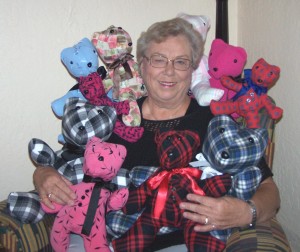Article published in the Hunterdon County Democrat
on October 07, 2014 at 1:48 p.m.
Up until this past October, Patty Gavornik’s mother, Gail, was living a full life. Although she had been diagnosed with cancer in 2008, she was still driving, shopping, enjoying her friends and her family. Gail was very pragmatic and organized and told her children that she did not want any more chemotherapy and wanted to be clear and feel the best that she could. She was prepared and had an Advance Directive (Living Will), health insurance, as well as long term care insurance.
The family all assumed that the doctors would tell them when the cancer had spread excessively, and when they should call hospice in. They also thought they would have these conversations so that they could prepare themselves mentally for the decline.
Unfortunately, over the course of one weekend everything changed. Gail became extremely short of breath and her ability to care for herself independently changed dramatically. While her family knew they were probably facing her last year of life, they had no idea how quickly she would decline.
Patty shared, “My siblings and I started spending as much time as we were able with my mother, who was still living alone. I tried to be over with her every day and my sister was coming down from Connecticut every weekend.” Stress was starting to build because they were trying to juggle helping their mom, working, living far away, taking care of their own families, and handling this medical situation that they felt very unprepared for. Gail was too weak to get to the doctor’s office and no one was advising them what to do at this point or telling them it was time to call hospice.
Patty explained, “Caregiving was very stressful because I felt like I didn’t know what I was doing. There were so many medical things going on and I wasn’t equipped or educated to know how to handle it. I kept leaving my mother’s house crying because I was so frustrated feeling like I was leaving her in a terrible situation and what I was doing was just not good enough.”
Patty’s neighbor was a former hospice nurse and she told her, “You might want to call Hunterdon Hospice.” Patty said, “We all talked about hospice in hushed tones and whispers behind mom’s back because the word hospice always equated to last rites. I didn’t want to scare her or have her think we were giving up on her. But we knew we needed help so we called Hunterdon Hospice and asked them to come out and talk to us, even though we still hadn’t told my mom.”
A representative from Hunterdon Hospice came and talked to Gail and explained that hospice would send a nurse to her home to check on her regularly, provide a social worker for emotional support, would provide the medicine needed to keep her comfortable, provide any medical equipment and supplies required, would send home health aides as needed to help with any physical care, and even provide volunteer support. Gail responded, “Well that sounds good! Why wouldn’t I want this?” When she heard that hospice was covered under Medicare she was even more pleased.
“It’s too bad we didn’t have this information sooner because from the minute hospice got involved it was like the biggest weight was lifted. Now there was someone who explained what was happening and what we could do to keep her comfortable. The nurse taught us caregiving skills. We also had the tools to care for her. Hospice brought us the medicine we needed to keep her comfortable. Our nurse, Myra, who was amazing, was so patient in explaining how tiny amounts of morphine would help her breathing. The home health aides that hospice provided were able to wash her hair and give her a sponge bath and change sheets and little things like that made such a difference. Knowing that we could call hospice anytime, 24 hours a day with any questions or concerns gave us such peace of mind. We actually spent over an hour on the phone with the hospice nurse at 3 a.m. on Christmas night,” Patty shared.
Patty’s only regret is that they didn’t start hospice a little sooner. “What a difference it would have made. Hospice was like having a “How To” book in your home; How To Care for Someone Who Is Dying and Keep Them Comfortable.” Patty felt that it was such a gift to be able to spend this time with her mom, so they could show her she was loved and keep her comfortable in the home she loved and felt the most comfortable in.
Hunterdon Hospice also provides bereavement care for families for one year after the loss of their loved one. Some of the services they offer are bereavement mailings, support groups and telephone contacts. Many of these services are available to anyone in the community.
“After my mother died, Hunterdon Hospice gave us a wonderful gift. One of the volunteers from Hunterdon Hospice made some memory items from articles of mom’s clothes. I gave them a special sweater that mom wore on an outing that we had that I will always remember,” Patty recalls. The volunteer made a gorgeous pillow out of that sweater. Gail also wore a beautiful bathrobe and fuzzy pink PJ top, and two memory bears were made from those that other family members have as keepsakes.
Don’t wait to learn about hospice services when you, or a loved one who has a terminal illness, is in a crisis. Know what services you are entitled to, so you can make decisions and get help at the appropriate time. Hunterdon Hospice wants to help provide the most supportive care so people can have the best quality of life. Remember, hospice doesn’t have to be such a scary word.
Note: Hunterdon Hospice provides services to people in Hunterdon County, New Jersey. There are hospices in all 50 states of the country. Hospices may be independent non-profit agencies, for-profit agencies or owned by a large business group. When searching for a hospice care provider, search the geographic area where the person in need of care lives. If more than one hospice serves that area, interview each hospice to find out how services are delivered and choose the one that best fits the needs of the patient and family.

